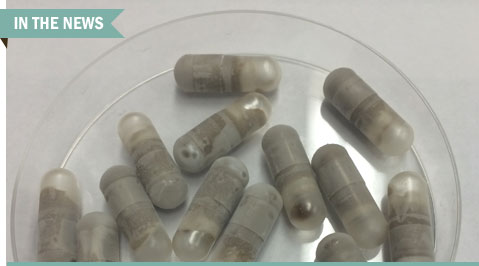
Oral, capsulated, fecal microbiota show promise in curing patients with recurrent Clostridium difficile infection (CDI), according to a study published in the Journal of the American Medical Association.
Researchers from Massachusetts General Hospital (MGH) in Boston determined that an oral pill was just as effective as more invasive methods of fecal microbiota transplant (FMT) therapy in ridding diarrhea caused by this pathogen. FMT restores normal flora through transplantation of a stool sample from a healthy donor. While effective in treating recurrent CDI, safety issues have prevented extensive use of this method.
“The procedures that have been used before—colonoscopies, nasogastric tubes, even enemas—all have potential risks and discomfort for patients. The use of capsules simplifies the procedure immensely, potentially making it accessible to a greater population,” said Ilan Youngster, MD, MMSc, a fellow in pediatric infectious diseases at MGH and at Boston Children’s Hospital and corresponding author of the JAMA report, in a statement from MGH.
Persistent CDI is difficult to treat. Annually, it accounts for 14,000 U.S. deaths. According to the study, the number of cases is growing among adults and children worldwide. Antibiotics are a common treatment, but not always effective. “Standard treatment with oral administration of metronidazole or vancomycin is increasingly associated with treatment failures, and disease recurrence has been described in up to 30% of patients after their first episode and up to 60% after 2 or more recurrences,” the study indicated.
Researchers enrolled 20 individuals between the ages of 11 and 84 with recurring CDI. Each ingested 15 acid-resistant capsules of FMT therapy over 2 consecutive days. Participants whose symptoms didn’t improve within 3 days were given an additional course of treatment with samples from the same healthy donor.
Fourteen of the participants recovered completely after just one treatment, with no CDI relapses over the next 2 months. Of the half-dozen who received an additional treatment 7 days after the first, five recovered from CDI symptoms.
Just one participant didn’t respond to two treatment courses. Another saw symptom resolution following the second course, but relapsed within 2 months. The researchers noted that those in poorer health were more likely to require a second treatment.
The results yielded a 90% success rate among this particular study group. Larger studies and additional experience are warranted to assess the long-term effectiveness and safety of this therapy, said Elizabeth Hohmann, MD, senior author of the JAMA report and an associate professor of Medicine at Harvard Medical School. “Further investigation should help determine the most effective microbial mixes for either oral or procedural administration,” she said in MGH’s statement.